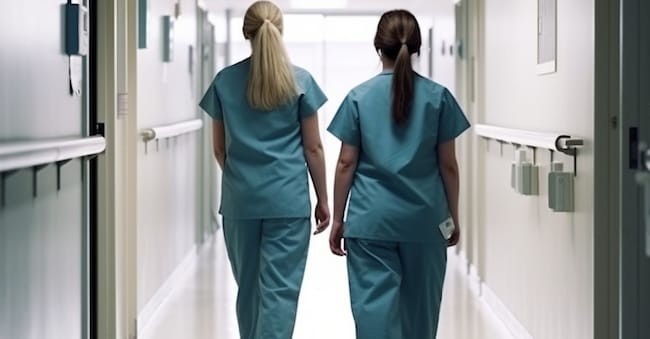From books to movies: here's why the perception of nurses can and must change.

by Silvestro Giannantonio * Pio Lattarulo **

Does clothing make the man? The old adage that the image a person, a professional, presents of themselves can be deemed irrelevant compared to the content they express, leaves one perplexed when one delves deeper from the surface. The decorum and professional image that the nursing profession still struggles to achieve, both within the professional enclave and externally, demonstrates this, and is confirmed by the blurred perception that society reveals of it.
“I've never received so many messages, a couple a week at most, someone passing through Milan or Cristina, a plump girl from Martina who's studying to become a nurse in Milan and with whom I've gone to Thursday night parties a couple of times.” “Why do you study to learn how to give an injection?” “Much more than to stay the same” (“It's Forbidden to Love” by Mario Desiati) . Despite the profound confusion in society's imagination regarding the role, skills, and educational path that nursing professions undertake, writers all seem to have very clear ideas on the subject. The fact is that the term nurse in the story includes everyone who isn't elected to the rank of doctor. Everyone, absolutely everyone. It would then seem almost necessary for many writers to describe a certain corporeality for nurses, implying the indispensable requirement of physicality to perform a “job” that requires powerful arms and sometimes some cognitive ability.
"Nurse Maria, however, looked exactly like Nurse Maria. Fat and maternal, cheerful and chatty, she shuffled around in rubber clogs and, by always speaking too loudly, immediately made that horrible situation seem normal" (Maurizio De Giovanni's "Gli occhi di Sara") . If imagery overwhelms image, the problem becomes even more significant and generates confusion and misunderstanding, contributing in some way to making the nursing profession even more unattractive. From American television and literary scenes, the figure of the paramedic emerges, further confusing everything (neither a doctor nor a nurse, but a technical figure), and for Italian translators, choosing the right terminology has never been a difficult task, given the widespread use of the word "paramedics."
But the media's portrayal of nurses, and especially of women nurses, doesn't depend solely on paper. Film and television have drawn heavily from the healthcare world to portray—positively or negatively—a series of historical figures. Their personalities, at times, are so powerful that they almost make people forget their profession.
Co-starring with the immense Jack Nicholson in the celebrated One Flew Over the Cuckoo's Nest, Nurse Mildred Ratched was a figure who embodies the concept of rigid and dehumanizing authority. This character recently took on a life of her own thanks to the Netflix TV series, aptly titled Ratched, which tells the story of Mildred, a nurse who arrives in Northern California in 1947 hoping to work at a prestigious psychiatric hospital where new (and disturbing) experiments on the human mind are being conducted.
The polar opposite of this cold depiction is the iconic 1980s animated series about Candy Candy, an orphan who becomes a nurse in Chicago during the war. A strong and determined character, Candy Candy faces numerous personal and professional challenges with courage and resilience. This series had a profound cultural impact, helping shape the image of nursing for many people and inspiring many young people to consider the profession as a life choice.
In those same years—it may seem incredible, but it's true—between the wicked Mildred and the loving Candy, the stereotype of the sexy nurse emerged in Italy, brought to the fore by the trend of low-budget, sheepish comedies, always with a similar plot, with the camera peering through the keyholes of hospitals and barracks. It's no surprise, then, that in the early 1990s, Antonio Ricci invented the sexy nurse Angela Cavagna to brighten up the Striscia la Notizia program, well before the showgirl phenomenon.
Of a completely different nature, and we're talking about today, is the solid and realistic cinematic reflection just released in Italian theaters on being a nurse in an increasingly aging, pathological Western society beset by physical and mental ailments. "The Problem Is Not Our Profession, It's the Circumstances" is the title of the novel-essay by young German nurse Madeline Calvelage, which inspired Petra Volpe 's film The Last Shift, a unique feature-length film entirely dedicated to the nursing profession, from the first to the last frame. The film was shot in Zurich, with a Swiss-German cast and production. However, the Swiss setting is essential. Those spotlessly clean, quiet, orderly, and hyper-technological hospitals are often described as "Mecca" for nurses across Europe, due to their better work organization and salaries that are double the average, for example, in Italy. These favorable circumstances do nothing to alleviate the suffering of a profession. And the film's documentary-like pace beautifully depicts the internal and external dynamics of a tough night shift. And this time, there's no room for gambles, jokes, or wiggles. By the end credits, the audience's empathy is definitely on her side, even though her constant race against time leads her to make some serious mistakes. But we don't empathize with the nurses out of pity, compassion, or a sense of charity. The sentences and data the director highlights after the final, poignant shot leave no room for doubt: the nurses' problem is the problem of an entire community.
A short story that contains a huge question for each of us: is it right that caring professions are so under-reported and under-valued, in a world that will increasingly need them?
* Journalist, communications manager for the National Federation of Nursing Professions
** Nurse, teaches ethics and professional deontology at the School of Law of the Alma Mater Studiorum of Bologna and at the School of Medicine of the University of Bari
News and insights on political, economic, and financial events.
Sign upilsole24ore





